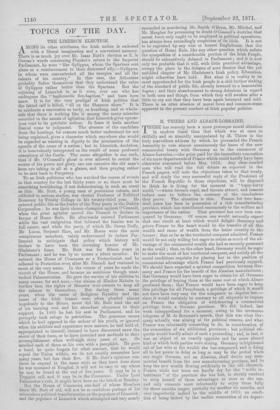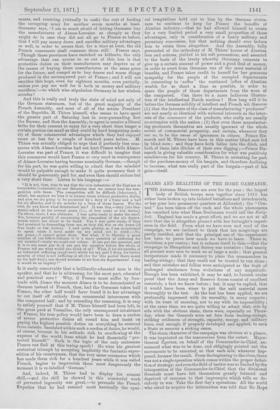M. THIERS AND ALSACE-LORRAINE.
THERE has scarcely been a more grotesque moral situation in modern times than that which was at once so skilfully and so absurdly manipulated by M. Thiers in the truly marvellous address by which he persuaded the French Assembly to vote almost unanimously the bases of the new commercial treaty with Germany as to the commerce of Alsace-Lorraine,—the price paid for the immediate evacuation, of six more departments of France which could hardly have been otherwise evacuated before May, 1872. Any clear-headed man who will road the full debate as reported in the French papers, will note the objections taken to that treaty, and will study the very successful reply of the President of the French Republic to those objections, will be disposed to think he is living for the moment in " topsy-turvy world,"—where favours repel, and threats attract, and reasons induce men to believe the contrary of the conclusions. they prove. The situation is this. France for two hun- dred years has been in possession of a rich manufacturing province, which has contributed enormously to the welfare anct importance of the nation. That province has now been con- quered by Germany. Of course one would naturally expect that one result at least which would delight Germany an& grieve France to the heart would be the transfer of all this• wealth and cause of wealth from the latter country to the former ; that so far as the territorial conquest admitted, France would be not only willing but eager to retain as much of the ad- vantage of the commercial wealth she had so recently possessed as she could ; that, on the other hand, Germany would be eager to make the most of her territorial conquest, and satisfy all the moral conditions requisite for placing her in the position of commercial advantage which France had previously enjoyed. We should have expected a spirited competition between Ger- many and France for the benefit of the Alsatian manufactures ; that Germany would have been eager to obtain for all Germans. the privilege of buying them at the same cost at which Alsace- prod aced them ; that France would have been eager to keep this privilege for all Frenchmen, a privilege of which it would not have been very easy for the conqueror to deprive her,— since it would certainly be contrary to all etiquette to impose- on France the obligation of withdrawing a commercial privilege from a German province. We did, indeed, last week misapprehend for a moment, owing to the erroneous telegram of M. do Remusat's speech, that this was what Ger- many actually was aiming at for political reasons, and what France was reluctantly consenting to do, in consideration of the evacuation of six additional provinces ; but political eti- quette would hardly admit of such a proceeding ; and, in fact, it was an object of an exactly opposite and far more absurd kind at which both parties were aiming. Germany is frightened out of her wits at the wealth' she has conquered, and is doing
i
all n her power to delay as long as may be the period when any single German, not an Alsatian, shall derive any com- mercial benefit from the new manufacturing province, and to keep the new wealth flowing artificially in the old channels. France, while her tears are hardly dry for the "noble in- habitants " of the province she has lost, is sternly resolved to strip herself of those advantages as soon as she can, and only consents most reluctantly to enjoy them fully for three months longer, partially for another six months, and very imperfectly indeed to the middle of 1873, on condi-
ments, and receiving (virtually in cash) the cost of feeding the occupying army for another seven months at least. 'Germany says, I am so much afraid of letting Germans buy the manufactures of Alsace-Lorraine as cheaply as they might do in case they did not all go to France as before, that I will pay money down and sacrifice military advantages as well, in order to secure that, for a time at least, the old French consumers shall consume them still.' France says,
Though these provinces have enriched us hitherto, the only advantage that can accrue to us out of this loss is that protective duties on their manufactures may deprive us of the means of buying these manufactures at the same price for the future, and compel us to buy dearer and worse things produced in the unconquered part of France ; and I will not sacrifice this hope, even for eighteen months, even partially, unless you pay me well for it both in money and military sacrifices,'—to which wise stipulation Germany in her wisdom accedes And this is really and truly the state of mind not only of the German statesmen, but of the great majority of the French Assembly, and most of all of the astute President of the Republic, M. Thiers himself, who seems to have spent the greater part of Saturday last in over-persuading first the Bureau, and then the Assembly, to agree to receive a liberal bribe for their consent to enjoy for a very short time longer a certain portion (as small as they could by hard bargaining make it) of those commercial advantages which they had enjoyed more or less for a couple of hundred years before. M. Thiers was actually obliged to urge that if perfectly free cora- snerce with Alsace-Lorraine had not hurt France while Alsace- Lorraine was part of France, it was difficult to imagine that this commerce would hurt France so very much in consequence of Alsace-Lorraine having become nominally German,—though for his part, he was quite willing to admit that the mischief would be palpable enough to make it quite necessary that it should be generously paid for, and even then should endure but a very short time. Listen to his language :— " It is not then, true to say that the iron-industries of the East are so 'formidable (redoutable) to our ibdustries that we cannot boar the oom- petition with them. The competition will be difficult (laborieuse), I admit, but anyhow we bore it in former times without protective duties, and now we are going to be protected by a duty of a franc and a half Tor six months, and in six months by a duty of three francs. For the rest, do you know what determined me? It was this,—they (the Ger- mans) asked us for several years [i.e., of free trade or low duties]. Up above, there, I was obdurate. I was quite ready to make the sacri- fice, however painful, of renouncing the evacuation of the six depart- ments which are about to be freed. Yes, I was quite ready, if they had persisted in demanding from me, as they did, five or six years [of free trade or low duties]. I said quite plainly, as I am accustomed to speak when I have made up my mind not to yield;—No, six yonrs,—I cannot grant them. But what, if to liberate a great number of our fellow-citizens it is a mere question of suffering for six months?—truly wo could not refuse. If one put the question, and it is so one must put it, if one put the question before the whole of France, toll me what would she think of us? What, if for six months of an industrial suffering (serf ranee) which for my part I deny, for twelve months of what is not suffering at all (for for this period there would be the half-duty), one should hesitate to sot free six departmental I say it would be an impiety I" Is it easily conceivable that a brilliantly-educated man is the speaker, and that he is addressing, for the most part, educated and practical men ? Why, if France must suffer by free- trade with Alsace the moment Alsace is to be denominated as German instead of French, then, had the Germans taken half 11'ranee, the other half would have found it to her advantage to cut itself off entirely from commercial intercourse with the conquered half; and by extending the reasoning, it is easy to satisfy yourself that if M. Thiers himself had been left., in the great park at Versailles, the only unconquered inhabitant of France, his true policy would have been to draw a cordon of severe protective duties all round him and insist on paying the highest possible duties on everything he received from outside. Insulated within such a cordon of duties, ho would, of course, become in his solitude rich to overflowing at the expense of the world, from which he had financially "pro- tected himself." Such is the logic of the only statesman France can find at this trying epoch! He wins his greatest oratorical triumph by accepting implicitly the fantastic super- etition of his countrymen, that the very same commerce which laas made them rich for a hundred years while it was called
French, begins to impoverish them most dangerously the moment it is re-labelled German.'
And, indeed, M. Thiers had to display his utmost skill,—and the skill he showed in this wonderful work of perverted ingenuity was great,—to persuade the French Deputies that he had resisted most heroically the cyni- cal temptations held out to him by the German states- men to continue to keep for France the benefits of Alsatian industry,—that he had allowed himself to retain for a very limited period a very small proportion of those advantages, only in consideration of a heavy military and pecuniary concession, but that nothing should ever induce him to retain them altogether. And the Assembly, fully persuaded of the orthodoxy of M. Thiers' horror of Alsatian iron and cottons, yielded to his soft persuasions, and assented to the basis of the treaty whereby Germany consents to give up a certain amount of power and a good deal of money, in order to avert from Germans one of the most material of benefits, and France takes credit to herself for her generous sympathy for the people of the occupied departments in consenting to suffer ' the continued influx of Alsatian wealth for as short a time as possible, in order to spare the people of those departments from the woes of the conquered. Can there be a more ludicrous illustra- tion of the intellectual Dutch auction ? How long will it be before the German solidity of intellect and French wit discover (1) that the interests of the class of manufacturing '° producers" are not nearly so identical with national interests as the inter- ests of the consumers of the products, who really are usually co-extensive with the nation ; (2) that even these manufactur- ing producers themselves are usually ignorant of the whole secret of commercial prosperity, and certain, whenever they are, so, to be the cause of ignorance in others. Prince Bis- marck and M. Thiers have been in this matter blind men led by blind men ; and they have both fallen into the ditch, and both of them into ditches of their own digging ;—Prince Bis- marck in giving valuable consideration for what was positively mischievous for his country, M. Thiers in mistaking for part of the purchase-money of his bargain, and therefore declining to increase, what was really part of the bargain—part of his gain—itself.































 Previous page
Previous page